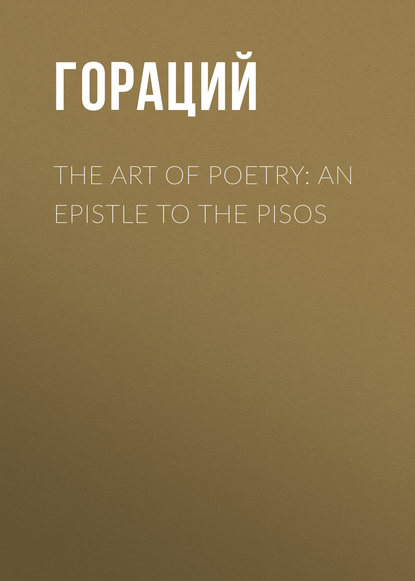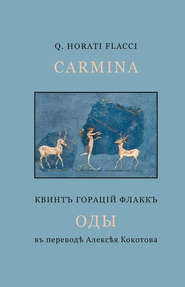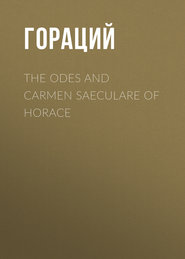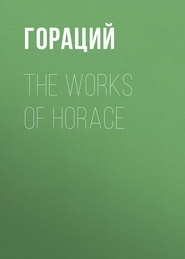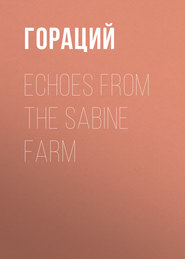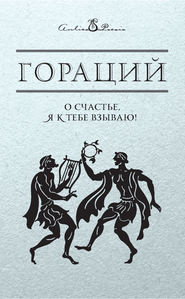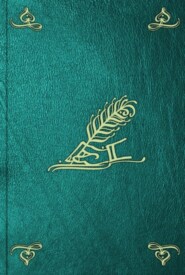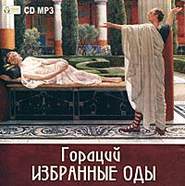По всем вопросам обращайтесь на: info@litportal.ru
(©) 2003-2024.
✖
The Art of Poetry: an Epistle to the Pisos
Настройки чтения
Размер шрифта
Высота строк
Поля
—Effert animi motus interprete lingua. Forces expression from the faithful tongue.
Buckingham has treated the subject of Dialogue very happily in his Essay on Poetry, glancing, but not servilely, at this part of Horace.
Figures of Speech, which Poets think so fine,
Art's needless varnish to make Nature shine,
Are all but Paint upon a beauteous face,
And in Descriptions only claim a place.
But to make Rage declaim, and Grief discourse,
From lovers in despair fine things to force,
Must needs succeed; for who can chuse but pity
A dying hero miserably witty?
201.–BE NOT YOUR OPENING FIERCE!] Nec sic incipies, Most of the Criticks observe, that all these documents, deduced from the Epick, are intended, like the reduction of the Iliad into acts, as directions and admonition to the Dramatick writer. Nam si in EPOPaeIA, que gravitate omnia poematum generae praecellit, ait principium lene esse debere; quanto magis in tragoedia et comoedia, idem videri debet? says de Nores. Praeceptum de intio grandiori evitaado, quod tam epicus quam tragicus cavere debet; says the Dauphin Editor. Il faut se souvenir qu' Horace appliqae à la Tragedie les regies du Poeme Epique. Car si ces debuts eclatans sont ridicules dans la Poeme Epique, ils le sont encore plus dans la Tragedie: says Dacier. The Author of the English Commentary makes the like observation, and uses it to enforce his system of the Epistle's being intended as a Criticism on the Roman drama. [ xviii] 202–Like the rude ballad-monger's chant of old] ut scriptor cyclicus olim.] Scriptor cyclicus signisies an itinerant Rhymer travelling, like Shakespeare's Mad Tom, to wakes, and fairs, and market-towns. 'Tis not precisely known who was the Cyclick Poet here meant. Some have ascribed the character to Maevius, and Roscommon has adopted that idea.
Whoever vainly on his strength depends,
Begins like Virgil, but like Maevius ends:
That Wretch, in spite of his forgotten rhimes,
Condemn'd to live to all succeeding times,
With pompous nonsense, and a bellowing sound,
Sung lofty Ilium, tumbling to the ground,
And, if my Muse can thro' past ages fee,
That noisy, nauseous, gaping fool was he;
Exploded, when, with universal scorn,
The Mountains labour'd, and a Mouse was born.
Essay on Translated Verse.
The pompous exordium of Statius is well known, and the fragments of Ennius present us a most tremendous commencement of his Annals.
horrida romoleum certamina pango duellum!
this is indeed to split our ears asunder
With guns, drums, trumpets, blunderbuss, and thunder!
211.—Say, Muse, the Man, &c.] Homer's opening of the Odyssey. his rule is perhaps no where so chastely observed as in the Paradise Lost. Homer's [Greek: Maenin aeide thea]! or, his [Greek: Andra moi ennepe,Mgsa]! or, Virgil's Arma, Urumque cano! are all boisterous and vehement, in comparison with the calmness and modesty of Milton's meek approach,
Of Man's first disobedience, &c.
215.—Antiphates, the Cyclops, &c].– Antiphatem, Scyllamque, & cum Cyclope Charybdim. Stories, that occur in the Odyssey. 218-19—Diomed's return—the Double Egg.]
The return of Diomede is not mentioned by Homer, but is said to be the subject of a tedious Poem by Antimachus; and to Stasimus is ascribed a Poem, called the Little Iliad, beginning with the nativity of Helen.
227.—Hear now!] Tu, quid ego, &c.
This invocation, says Dacier justly, is not addressed to either of the Pisos, but to the Dramatick Writer generally.
229.–The Cloth goes down.] Aulaea manentis. This is translated according to modern manners; for with the Antients, the Cloth was raised at the Conclusion of the Play. Thus in Virgil's Georgicks;
Vel scena ut versis disceedat frontibus, atque
Purpurea intexti tollant aulaea Britanni.
Where the proud theatres disclose the scene;
Which interwoven Britons seem to raise;
And shew the triumph which their shame displays.
Dryden
230.—Man's several ages, &c.] aetatis cujusque, &c. Jason Demores takes notice of the particular stress, that Horace lays on the due discrimination of the several Ages, by the solemnity with which he introduces the mention of them: The same Critick subjoins a note also, which I shall transcribe, as it serves to illustrate a popular passage in the As you Like It of Shakespeare.
All the world's a stage,
And all the men and women merely players;
They have their exits and their entrances,
And one man in his time plays many parts:
His acts being seven ages. At first the infant,
Mewling and puking in the nurse's arms:
And then, the whining school-boy with his satchel,
And shining morning-face, creeping like snail
Unwillingly to school. And then, the lover;
Sighing like furnace, with a woeful ballad
Made to his mistress' eye-brow. Then, a soldier;
Full of strange oaths, and bearded like the pard,
Jealous in honour, sudden and quick in quarrel;
Seeking the bubble reputation
Even in the cannon's mouth. And then, the justice
In fair round belly, with good capon lin'd
With eyes severe, and beard of formal cut,
Full of wise saws and modern instances,
And so he plays his part. The sixth age shifts
Into the lean and flipper'd pantaloon,
With spectacles on nose, and pouch on side;
His youthful hose well sav'd, a world too wide
For his shrunk shank; and his big manly voice,
Turning again toward childish treble, pipes,
And whistles in his sound. Last scene of all,
That ends this strange eventful history,
Is second childishness, and mere oblivion,
Sans teeth, sans eyes, sans taste, sans everything.
Animadverti a plerisque hominis aetatem in septem divisam esse partes, infantiam, pueritiam, adolescentiam, juventutem, virilitatem, senectutem, & ut ab illis dicitur, decrepitatem. In hâc verò parte nihil de infantiae moribus Horatius, cum nihil ea aetas praeter vagitum habeat proprium, ideòque infantis persona minimè in scenâ induci possit, quòd ipsas rerum voces reddere neque dum sciat, neque valeat. Nihil de moribus item hujus aetatis, quam, si latinè licet, decrepitatem vocabimus, quae aetas quodammodo infantiae respondet: de juventute autem & adolescentia simul pertractat, quòd et studiis, et naturâ, & voluntate, parum, aut nihil inter se differant. Aristoteles etiam in libris ad Theodectem omisit & pueritiam, & meritò; cum minime apud pueros, vel de pueris sit orator habiturus orationem. Ille enim ad hoc ex aetate personarum differentiam adhibet, ut instituat oratorem, quomodo moratâ uti debeat oratione, id est, eorum moribus, apud quos, & de quibus loquitur, accommodatâ.
It appears from hence, that it was common for the writers of that time, as well as Shakespeare's Jaques, to divide the life of Man into seven ages, viz. Infancy, Childhood, Puberty, Youth, Manhood, Old Age, and Decrepitude; "which last, (says Denores) in some sort answers to Infancy," or, as Shakespeare expresses it, IS second childishness.
"Before Shakespeare's time," says Warburton, "seven acts was no unusual division of a play, so that there is a greater beauty than appears at first sight in this image." Mr. Steevens, however, informs us that the plays of that early period were not divided into acts at all. It is most probable therefore that Shakespeare only copied the moral philosophy (the Socraticae chartae) of his own day, adapting it, like Aristotle and Horace, to his own purpose; and, I think, with more felicity, than either of his illustrious predecessors, by contriving to introduce, and discriminate, every one of the seven ages. This he has effected by assigning station and character to some of the stages, which to Aristotle and Horace appeared too similar to be distinguished from each other. Thus puberty, youth, manhood, and old age, become under Shakespeare's hand, the lover, the soldier, the justice, and the lean and flipper'd pantaloon; while the natural qualities of the infant, the boy, and the dotard, afford sufficient materials for poetical description.
262.—Thus years advancing many comforts bring, and flying bear off many on their wing.]
Multa ferunt anni venientes commoda secum, multa recedentes adimunt.
Aristotle considers the powers of the body in a state of advancement till the 35th year, and the faculties of the mind progressively improving till the 49th; from which periods they severally decline. On which circumstance, applied to this passage of Horace, Jason de Nores elegantly remarks, Vita enim nostra videtur ad virilitatem usque, quâ in statu posita est, quendam quasi pontem aetatis ascendere, ab eâque inde descendere. Whether Addison ever met with the commentary of De Nores, it is perhaps impossible to discover. But this idea of the ascent and declivity of the bridge of human life, strongly reminds us of the delightful vision of mirza.
288.—An actor's part the Chorus should sustain.] Actoris partes Chorus, &c.
Buckingham has treated the subject of Dialogue very happily in his Essay on Poetry, glancing, but not servilely, at this part of Horace.
Figures of Speech, which Poets think so fine,
Art's needless varnish to make Nature shine,
Are all but Paint upon a beauteous face,
And in Descriptions only claim a place.
But to make Rage declaim, and Grief discourse,
From lovers in despair fine things to force,
Must needs succeed; for who can chuse but pity
A dying hero miserably witty?
201.–BE NOT YOUR OPENING FIERCE!] Nec sic incipies, Most of the Criticks observe, that all these documents, deduced from the Epick, are intended, like the reduction of the Iliad into acts, as directions and admonition to the Dramatick writer. Nam si in EPOPaeIA, que gravitate omnia poematum generae praecellit, ait principium lene esse debere; quanto magis in tragoedia et comoedia, idem videri debet? says de Nores. Praeceptum de intio grandiori evitaado, quod tam epicus quam tragicus cavere debet; says the Dauphin Editor. Il faut se souvenir qu' Horace appliqae à la Tragedie les regies du Poeme Epique. Car si ces debuts eclatans sont ridicules dans la Poeme Epique, ils le sont encore plus dans la Tragedie: says Dacier. The Author of the English Commentary makes the like observation, and uses it to enforce his system of the Epistle's being intended as a Criticism on the Roman drama. [ xviii] 202–Like the rude ballad-monger's chant of old] ut scriptor cyclicus olim.] Scriptor cyclicus signisies an itinerant Rhymer travelling, like Shakespeare's Mad Tom, to wakes, and fairs, and market-towns. 'Tis not precisely known who was the Cyclick Poet here meant. Some have ascribed the character to Maevius, and Roscommon has adopted that idea.
Whoever vainly on his strength depends,
Begins like Virgil, but like Maevius ends:
That Wretch, in spite of his forgotten rhimes,
Condemn'd to live to all succeeding times,
With pompous nonsense, and a bellowing sound,
Sung lofty Ilium, tumbling to the ground,
And, if my Muse can thro' past ages fee,
That noisy, nauseous, gaping fool was he;
Exploded, when, with universal scorn,
The Mountains labour'd, and a Mouse was born.
Essay on Translated Verse.
The pompous exordium of Statius is well known, and the fragments of Ennius present us a most tremendous commencement of his Annals.
horrida romoleum certamina pango duellum!
this is indeed to split our ears asunder
With guns, drums, trumpets, blunderbuss, and thunder!
211.—Say, Muse, the Man, &c.] Homer's opening of the Odyssey. his rule is perhaps no where so chastely observed as in the Paradise Lost. Homer's [Greek: Maenin aeide thea]! or, his [Greek: Andra moi ennepe,Mgsa]! or, Virgil's Arma, Urumque cano! are all boisterous and vehement, in comparison with the calmness and modesty of Milton's meek approach,
Of Man's first disobedience, &c.
215.—Antiphates, the Cyclops, &c].– Antiphatem, Scyllamque, & cum Cyclope Charybdim. Stories, that occur in the Odyssey. 218-19—Diomed's return—the Double Egg.]
The return of Diomede is not mentioned by Homer, but is said to be the subject of a tedious Poem by Antimachus; and to Stasimus is ascribed a Poem, called the Little Iliad, beginning with the nativity of Helen.
227.—Hear now!] Tu, quid ego, &c.
This invocation, says Dacier justly, is not addressed to either of the Pisos, but to the Dramatick Writer generally.
229.–The Cloth goes down.] Aulaea manentis. This is translated according to modern manners; for with the Antients, the Cloth was raised at the Conclusion of the Play. Thus in Virgil's Georgicks;
Vel scena ut versis disceedat frontibus, atque
Purpurea intexti tollant aulaea Britanni.
Where the proud theatres disclose the scene;
Which interwoven Britons seem to raise;
And shew the triumph which their shame displays.
Dryden
230.—Man's several ages, &c.] aetatis cujusque, &c. Jason Demores takes notice of the particular stress, that Horace lays on the due discrimination of the several Ages, by the solemnity with which he introduces the mention of them: The same Critick subjoins a note also, which I shall transcribe, as it serves to illustrate a popular passage in the As you Like It of Shakespeare.
All the world's a stage,
And all the men and women merely players;
They have their exits and their entrances,
And one man in his time plays many parts:
His acts being seven ages. At first the infant,
Mewling and puking in the nurse's arms:
And then, the whining school-boy with his satchel,
And shining morning-face, creeping like snail
Unwillingly to school. And then, the lover;
Sighing like furnace, with a woeful ballad
Made to his mistress' eye-brow. Then, a soldier;
Full of strange oaths, and bearded like the pard,
Jealous in honour, sudden and quick in quarrel;
Seeking the bubble reputation
Even in the cannon's mouth. And then, the justice
In fair round belly, with good capon lin'd
With eyes severe, and beard of formal cut,
Full of wise saws and modern instances,
And so he plays his part. The sixth age shifts
Into the lean and flipper'd pantaloon,
With spectacles on nose, and pouch on side;
His youthful hose well sav'd, a world too wide
For his shrunk shank; and his big manly voice,
Turning again toward childish treble, pipes,
And whistles in his sound. Last scene of all,
That ends this strange eventful history,
Is second childishness, and mere oblivion,
Sans teeth, sans eyes, sans taste, sans everything.
Animadverti a plerisque hominis aetatem in septem divisam esse partes, infantiam, pueritiam, adolescentiam, juventutem, virilitatem, senectutem, & ut ab illis dicitur, decrepitatem. In hâc verò parte nihil de infantiae moribus Horatius, cum nihil ea aetas praeter vagitum habeat proprium, ideòque infantis persona minimè in scenâ induci possit, quòd ipsas rerum voces reddere neque dum sciat, neque valeat. Nihil de moribus item hujus aetatis, quam, si latinè licet, decrepitatem vocabimus, quae aetas quodammodo infantiae respondet: de juventute autem & adolescentia simul pertractat, quòd et studiis, et naturâ, & voluntate, parum, aut nihil inter se differant. Aristoteles etiam in libris ad Theodectem omisit & pueritiam, & meritò; cum minime apud pueros, vel de pueris sit orator habiturus orationem. Ille enim ad hoc ex aetate personarum differentiam adhibet, ut instituat oratorem, quomodo moratâ uti debeat oratione, id est, eorum moribus, apud quos, & de quibus loquitur, accommodatâ.
It appears from hence, that it was common for the writers of that time, as well as Shakespeare's Jaques, to divide the life of Man into seven ages, viz. Infancy, Childhood, Puberty, Youth, Manhood, Old Age, and Decrepitude; "which last, (says Denores) in some sort answers to Infancy," or, as Shakespeare expresses it, IS second childishness.
"Before Shakespeare's time," says Warburton, "seven acts was no unusual division of a play, so that there is a greater beauty than appears at first sight in this image." Mr. Steevens, however, informs us that the plays of that early period were not divided into acts at all. It is most probable therefore that Shakespeare only copied the moral philosophy (the Socraticae chartae) of his own day, adapting it, like Aristotle and Horace, to his own purpose; and, I think, with more felicity, than either of his illustrious predecessors, by contriving to introduce, and discriminate, every one of the seven ages. This he has effected by assigning station and character to some of the stages, which to Aristotle and Horace appeared too similar to be distinguished from each other. Thus puberty, youth, manhood, and old age, become under Shakespeare's hand, the lover, the soldier, the justice, and the lean and flipper'd pantaloon; while the natural qualities of the infant, the boy, and the dotard, afford sufficient materials for poetical description.
262.—Thus years advancing many comforts bring, and flying bear off many on their wing.]
Multa ferunt anni venientes commoda secum, multa recedentes adimunt.
Aristotle considers the powers of the body in a state of advancement till the 35th year, and the faculties of the mind progressively improving till the 49th; from which periods they severally decline. On which circumstance, applied to this passage of Horace, Jason de Nores elegantly remarks, Vita enim nostra videtur ad virilitatem usque, quâ in statu posita est, quendam quasi pontem aetatis ascendere, ab eâque inde descendere. Whether Addison ever met with the commentary of De Nores, it is perhaps impossible to discover. But this idea of the ascent and declivity of the bridge of human life, strongly reminds us of the delightful vision of mirza.
288.—An actor's part the Chorus should sustain.] Actoris partes Chorus, &c.
Другие электронные книги автора Квинт Гораций Флакк
Другие аудиокниги автора Квинт Гораций Флакк
Избранные оды




 4.67
4.67





